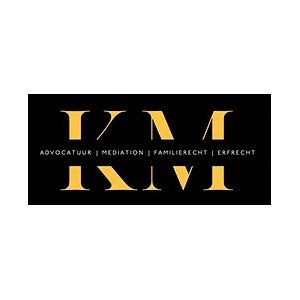Best Elder Abuse Law Lawyers in Netherlands
Share your needs with us, get contacted by law firms.
Free. Takes 2 min.
Or refine your search by selecting a city:
List of the best lawyers in Netherlands
About Elder Abuse Law in Netherlands
Elder abuse law in the Netherlands is designed to protect older individuals from various forms of abuse, including physical, emotional, financial, and neglect. The law recognizes the vulnerability of older adults and seeks to provide comprehensive legal recourses to ensure their safety and well-being. The legal framework emphasizes the protection of human rights and the promotion of autonomy for the elderly while ensuring appropriate care and respect.
Why You May Need a Lawyer
Elder abuse can manifest in numerous situations where legal help might be necessary. For instance, if an elderly person is suspected of being physically or emotionally abused by caregivers or family members, expert legal advice might be required to navigate the legal system and obtain protection orders. Financial exploitation is another common issue where legal intervention may be needed, as elder individuals may fall victim to fraudulent schemes or coercion. A lawyer specializing in elder abuse law can also assist in ensuring that proper care and living conditions are maintained by care institutions or nursing homes.
Local Laws Overview
The Netherlands has a robust legal framework to address elder abuse, often categorized under general domestic abuse and neglect laws. Specific provisions under the Dutch Civil Code and Criminal Code can be invoked in cases of elder abuse. Key legal instruments include the Adults and Health Care Act (Wet op de zorginstellingen, Wzi), which ensures quality care in healthcare settings, and the Act on Financial Supervision concerning financial exploitation. The Social Support Act (Wet maatschappelijke ondersteuning, Wmo) provides frameworks for supporting victims through local municipalities.
Frequently Asked Questions
What forms of abuse are recognized under elder abuse law in the Netherlands?
Elder abuse law in the Netherlands recognizes physical, emotional, financial abuse, and neglect as forms of elder mistreatment and has legal recourse for each.
How can I report elder abuse in the Netherlands?
Individuals can report suspected elder abuse to local authorities, healthcare providers, or directly to the police. The firm Veilig Thuis, a national advisory and reporting center for domestic abuse, can also be contacted.
What protections are offered to elders who report abuse?
Legal and social support structures are in place to protect those who report elder abuse. This may include restraining orders and coordination with social services to ensure the safety and well-being of the elder involved.
Can family members be prosecuted for elder abuse?
Yes, family members can be prosecuted if found guilty of elder abuse. Dutch criminal law treats such instances seriously, with penalties commensurate with the harm caused.
What should I do if I suspect financial exploitation of an elder?
Immediate action includes contacting a lawyer to assess the situation legally. Notifying the police or financial institutions directly involved may help to freeze accounts or reverse unauthorized transactions.
How are care institutions regulated to prevent elder abuse?
The Dutch Health and Youth Care Inspectorate oversees care institutions, ensuring compliance with healthcare standards, and is responsible for investigating reported concerns of elder abuse in these settings.
Is there any financial aid available for elder abuse victims in the Netherlands?
Yes, government programs under the Social Support Act may provide financial assistance and support services to victims of elder abuse requiring intervention or support.
How does the legal process work in elder abuse cases?
Initially, evidence collection and reporting are crucial. Legal proceedings will involve court hearings, during which proof is presented, and the accused has a right to defense. A lawyer helps navigate these complexities.
What legal rights do elders have regarding their care in the Netherlands?
Elders have the right to receive proper care and treatment, live in a safe environment, and have autonomy in personal decisions unless proven incapable. Legal instruments ensure these rights are protected.
Can I represent an elder in legal matters if they are unable to do so themselves?
Yes, under certain circumstances, individuals may be appointed as legal representatives, usually through a power of attorney or guardianship order, enabling them to represent an elder's interests legally.
Additional Resources
Several resources provide further information and assistance related to elder abuse law in the Netherlands. Veilig Thuis offers national support on preventing and addressing domestic abuse. The Dutch Ombudsman for Older People advocates for elder rights. The Netherlands Bar Association can also help find specialized legal professionals. Local municipalities and health care facilities may offer support services under the Social Support Act.
Next Steps
If you need legal assistance in elder abuse law, consider the following steps: consult with a legal expert specializing in elder law; gather all relevant documentation concerning the elder's situation; reach out to national helplines like Veilig Thuis; and consider informing local authorities if immediate action is required. These steps will help ensure that you or your loved one is protected and receives appropriate legal advice.
Lawzana helps you find the best lawyers and law firms in Netherlands through a curated and pre-screened list of qualified legal professionals. Our platform offers rankings and detailed profiles of attorneys and law firms, allowing you to compare based on practice areas, including Elder Abuse Law, experience, and client feedback.
Each profile includes a description of the firm's areas of practice, client reviews, team members and partners, year of establishment, spoken languages, office locations, contact information, social media presence, and any published articles or resources. Most firms on our platform speak English and are experienced in both local and international legal matters.
Get a quote from top-rated law firms in Netherlands — quickly, securely, and without unnecessary hassle.
Disclaimer:
The information provided on this page is for general informational purposes only and does not constitute legal advice. While we strive to ensure the accuracy and relevance of the content, legal information may change over time, and interpretations of the law can vary. You should always consult with a qualified legal professional for advice specific to your situation.
We disclaim all liability for actions taken or not taken based on the content of this page. If you believe any information is incorrect or outdated, please contact us, and we will review and update it where appropriate.
Browse elder abuse law law firms by city in Netherlands
Refine your search by selecting a city.
















